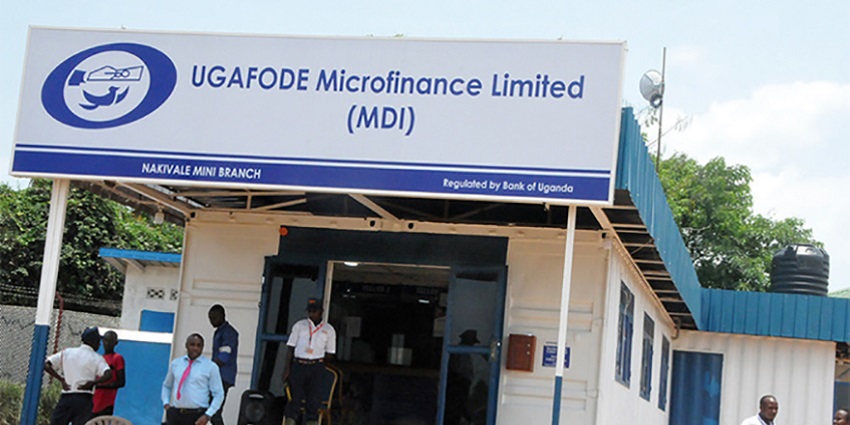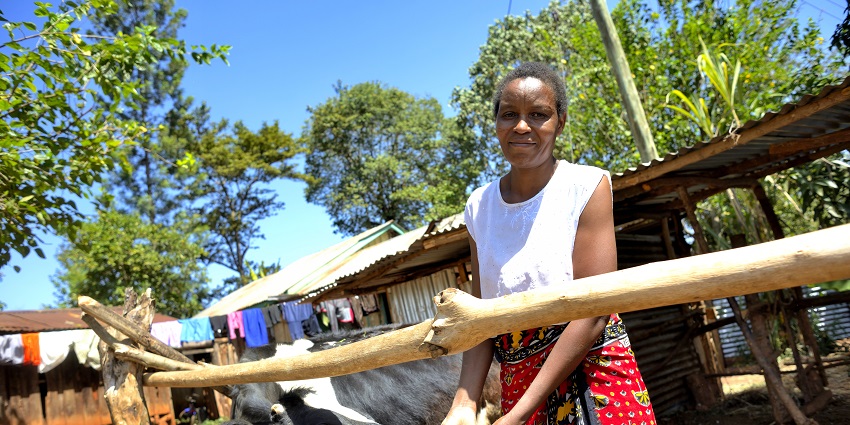26,2M€
Wallet
14 516
Number of beneficiaries
31 %
Women beneficiaries
64 %
Rural beneficiaries
Uganda
Financial services
Funding granted
Loan of €2.1M*
(local currency equivalent)
Foundation Partner
since 2015
*Outstanding at grant value
Context :
Uganda's economy is traditionally based on agriculture (80% of the active population), particularly coffee; it is developing slowly despite an often unfavorable regional context.
The institution:
Since its inception in 1994, UGAFODE has been mobilizing resources to provide affordable primary financial services to its clients. UGAFODE's mission is to transform the lives of Ugandans, both economically and socially.
Impact :
UGAFODE provides inclusive financial and non-financial services to empower the Ugandan people, especially in rural areas, through well-designed and tailored financial products and offerings to facilitate economic growth and development.
“Putting finance to work for refugees” by the ILO
Every month, the International Labour Organization (ILO) publishes "Social Finance Brief," a publication that traces the journey of financial service providers around the world. In the January 2022 edition, the ILO documented the journey of the Uganda Agency for Development Limited (UGAFODE), an organization supported by the Gramen Crédit Agricole Foundation.
UGAFODE is one of the microfinance institutions benefiting from a program launched by the Foundation, the United Nations High Commissioner for Refugees (UNHCR) and the Swedish International Development Cooperation Agency (Sida) to promote the financial and non-financial inclusion of refugees and host communities in Uganda.
Through the program, UGAFODE opened a mini-branch in the Nakivale refugee camp in Uganda. It received financial support to open the branch in Nakivale and technical support, coordinated by the Grameen Crédit Agricole Foundation, to develop a range of products and services tailored to the needs of refugees.
The ILO's "Social Finance Brief" describes the evolution of UGAFODE's decision-making and operational processes to become an inclusive actor serving refugees and host communities. UGAFODE is an example of good practice for the microfinance sector and a compelling story of the impact of the Foundation and its partners' work on the ground.
UGAFODE, the Foundation's partner in Uganda, expands its services to refugees

© Didier Gentilhomme
UGAFODE Microfinance Limited (MDI) has opened a branch in Nakivale Refugee Settlement, Isingiro District. The microfinance institution, which is regulated by the Bank of Uganda, is at the forefront of financial inclusion for thousands of refugees.
The initiative aims to create sustainable livelihoods, resilience, and self-reliance for refugees in both settlement and host communities. This follows a successful pilot financial inclusion project for refugees in Kampala. As part of the project, refugees continue to have access to credit, savings, and money transfer services.
During the pilot phase, UGAFODE adjusted its procedures, including documentation requirements such as identification (a refugee identity card issued by the Prime Minister's Office - Refugee Department). "Serving refugees fits well with our mission to transform the lives of low-income but economically active populations. Refugees are economically active and have financial needs like everyone else and deserve the utmost attention," Shafi Nambobi, UGAFODE's Managing Director, said recently. He commended the Prime Minister's Office - Refugee Department for contributing to the initiative's success. He also acknowledged the work of the United Nations High Commissioner for Refugees and the Swedish International Development Cooperation Agency, which, through the Grameen Credit Agricole Foundation, supported the project to establish this agency in Nakivale.
Nakivale camp hosts more than 100,000 refugees from 13 countries. Most of them work in agriculture and trade. "With the Nakivale branch, we will expand financial services to small-scale refugee farmers and members of the host community, thereby improving household incomes," Nambobi added. According to Nambobi, the institution plans to roll out financial services for refugees in other settlements in the future.
According to the refugees interviewed, the UGAFODE Nakivale branch saves them from traveling long distances to access financial services in Mbarara or Isingiro. "With the establishment of this UGAFODE branch in our camp, financial services have been brought to our backyard. We can now be served easily," said one of the refugees. Another refugee said that previously, due to poor road conditions, it took a day just to get to the bank. The refugees emphasized that the branch would help them save on transportation costs and time wasted traveling.
More information about the refugee program here.
During the first quarter, the Foundation made five investments in Africa

© Didier Gentilhomme
During the first quarter of 2019, the Grameen Crédit Agricole Foundation intensified its presence with its African partners by granting five new financings, notably in the form of senior loans. As of the end of March 2019, it had 40 partners in Sub-Saharan Africa, representing 42% of the total outstanding amount.
The Foundation thus granted, as part of the African Facility program, a local currency loan equivalent to €800,000 to the microfinance institution Eclof Kenya, which offers financial and non-financial services to micro, small, and medium-sized enterprises in the country, while actively promoting savings. To date, the institution, which finances 58% of women, has more than 30,000 clients, 60% in rural areas.
Also in East Africa, the Foundation also granted a new loan in local currency equivalent to €1 million to UGAFODE, a Ugandan microfinance institution whose primary mission is to provide its clients with affordable primary financial services. The institution currently has 17,300 clients, including nearly 201,000 women and approximately 801,000 rural clients.
In West Africa, the Foundation granted a new loan to the Togolese microfinance institution Coopec Sifa for €305,000 in local currency. Coopec Sifa, which is financed under the African Facility, is a microfinance institution that offers small loans to its nearly 38,000 clients, primarily women (86%) in the north of the country.
In addition, ACEP Burkina was also granted a new loan of €2.3 million in CFA francs. This microfinance institution, a partner of the Foundation since 2016, specializes in financing microenterprises and very small businesses in urban centers and inner suburbs. It currently has 12,300 clients, including 20% women.
Finally, in Senegal, the Foundation strengthened its partnership with Laiterie du Berger, in which it has been a shareholder since 2010, by granting a loan in the form of a shareholder current account, for an amount in CFA francs equivalent to 229,000 euros. Laiterie du Berger is a social enterprise that recycles milk collected from Fulani herders in the north of the country, transforming it into yogurts and other dairy products sold under the Dolima brand.
To learn more about the Foundation's partners, click here.
